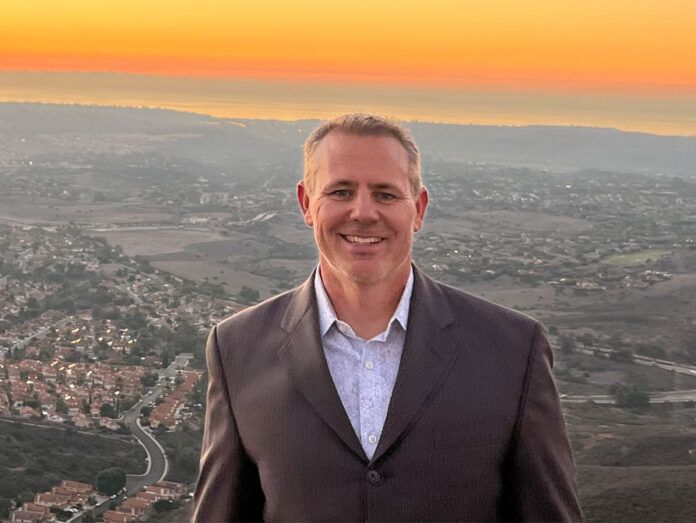John Gunderson, 46, is a non-partisan candidate for San Diego County Sheriff who does not accept donations, does not solicit endorsements and believes the sheriff should remain apolitical.
He said he’s never really thought about emulating a particular person in law enforcement, but generally believes any good leader provides goals for their staff and empowers them to come up with programs which work toward success.
Over his career, Gunderson served three years as a San Diego County deputy sheriff, four years with San Diego Police Department and four years with the District Attorney. He currently commutes to northern California several days a week to head the Redwood City Police Department administrative services division which includes internal affairs, training, personnel and recruiting, and fiscal management and policy development.
“Honestly, I think I’m the most qualified in the race. Of the seven candidates running, I’m one of a few currently in law enforcement, the only one with a master’s degree— although that in itself doesn’t mean you should be a good leader, but I also have multiple law enforcement agencies’ experience as well as the prosecutor’s office,” Gunderson, who holds both a bachelors’ and master’s degree in criminal justice said.
Those credentials matter because it is important for the sheriff to evolve as society changes, he said but doing so is challenging for anyone who has solely worked with one agency. Some of the issues with the sheriff’s office, he said, are a result of that insular experience.
“You see deputies leaving in greater numbers than coming in. It seems obvious to me: there are a high number of jail deaths, internal ethical issues… law enforcement in general has a culture of not embracing transparency and I’ve never understood why,” Gunderson said.
The first thing he would do if elected, he said, is make sure the Citizens Law Enforcement Review Board has enough resources and is doing their job. He supports extending CLERB’s jurisdiction to medical personnel in an effort to gather more data.
“If we’re trying to get answers, we need to understand why we’re getting it wrong. One fault of the current system is the seeming focus on mitigating or limiting liability when it should be on openly saying ‘We got it wrong’,” Gunderson said.
In-jail deaths are critical and “have such a significant impact on family members” that anything the agency can do to make the process more transparent is better, he said.
Gunderson’s second priority would be addressing homelessness.
“The rhetoric says homelessness is not a law enforcement problem. With local municipalities that might be more true but with the county— the sheriff should be leading the charge, taking the lead to bring groups together to solve the problem,” Gunderson said.
Referencing a Boise, Idaho case in which the federal appeals court said it is unconstitutional to punish people for sleeping on the sidewalk when there aren’t enough shelter beds or housing available, Gunderson said his approach would be to create safe parking and camping areas where social service providers could focus funding and programming in a concentrated area.
The safe community would be proportionally funded by the county and local municipalities based on population, would provide tent housing, food, medical & safety services, and education opportunities and assist people with reentering society on their own schedules.
At the same time, Gunderson would prohibit encampments on any other public property in the county.
“As a society, we have an obligation to provide for our own people, if you create that area it benefits the rest of the community. We can tell people ‘this is an area where you can safely sleep at night’ with services available but you can no longer pitch a tent on the sidewalk, compile trash and bicycles that generally make the area uninhabitable for everyday people. You can’t force someone to take help but we can create an area with consolidated services,” Gunderson said.
There are different segments of homeless residents, he said, including some who have criminal tendencies and some who “want to wake up and do whatever” but those truly seeking support should be able to get help, get back to work, and be placed in temporary or a permanent stable home.
“The folks who fall into homelessness, we should really support them to get them back to a stable side of life,” Gunderson said.
A sheriff’s department should embody the values of the community it serves, he said and the sheriff can function more efficiently if they build a positive relationship with the community, including refugee and immigrant communities. To build that relationship he would proactively reach out through programs like citizens’ academies developed in native languages.
“People’s perception of law enforcement is based on the society or country where they grew up. Until they learn how law enforcement operates here, how it is different, it’s important to reach out to bring people into the fold, talk with them, ask what we can do for them,” Gunderson said.
He said he has not seen much come out of specialized groups like the LGBTQ+ Advisory Council developed by retired Sheriff Bill Gore but backs gathering information and opening up communication directly with different sections of the community.
“I don’t know how else you’d gather information, build trust and get perspective than with someone living in the community,” Gunderson said.
He would also focus on building relationships with young adults in schools. He believes having Campus Resources Officers in schools is currently “a benefit that oftentimes leads to better relationships” but should be utilized in a way that reflects what society wants.
Gunderson was an Explorer, part of a program intended to provide young adults with on-the-job exposure to the county’s sheriff department and consider a career in law enforcement.
“Children need a place to go after school- they need more than just idle time on their hands. I would work to expand community programs, grow that relationship,” Gunderson said.
He said he believes in proactive law enforcement, said crime has risen significantly because criminals know there was no accountability to be had with COVID zero bail policies.
The pandemic-era zero bail policy that began in April 2020 essentially turned detainees back onto the streets in an effort to reduce jail numbers and ostensibly lower the number of COVID-positive cases in close quarters. That practice was rescinded on May 15.
Laws, Gunderson said, might seem well-intentioned and reasonable to everyday people but it is not fair to the public to set impossible expectations with people who are willing to break laws.
“With zero bail and cases being pushed off for months and months, criminals think they can get away with something. Reducing crime has to be in partnership with state legislators and the District Attorney,” Gunderson said.
Currently, one of the biggest flaws in the criminal justice system, he said, is the practice of inadvertently punishing people for exercising their rights. Gunderson, who worked as a prosecutor with the District Attorney for four years said “it was a great job with great people” but he didn’t like how their trial approach was structured.
“Someone allegedly commits a crime, they’re arrested and offered a plea deal but if they say they want to exercise their right to go to trial, that plea deal is taken off the table. I know it discourages people who likely would be found innocent but the risk is too great: the possibility of serving three years instead of, say, six months with a plea deal. They give up, say they’re just going to serve,” Gunderson said.
Although he believes “the vast majority are guilty of at least part of the crime,” he doesn’t agree with the approach that potentially puts innocent people behind bars.
“Having worked with the prosecutors, it’s given me the perspective to know if we arrest someone we better know they are guilty of that crime and have evidence,” Gunderson said.
Sometimes, he said, law enforcement is skeptical of providing information to the public, of having it spun with unfavorable optics or risk compromising an investigation but generally he believes in using news media and social media outlets to inform the public and keep residents apprised of news.
Although he said he is not sure if it’s entirely appropriate for major announcements, it can be useful for a general advisory and for building a positive relationship with the community.
“Personally, I don’t use social media but, for a public agency, it’s the easiest way to push out information. When you’re sitting in traffic completely stopped, you want to know how long you’ll be there; when you’re in a public area and concerned about loved ones— in that case I would use social media,” Gunderson said.
Although running for Sheriff isn’t his “life’s dream” Gunderson said he thinks there is a need for him to run.
“Would I run again? No, no. Well, I guess you can never entirely rule anything out,” Gunderson said.















